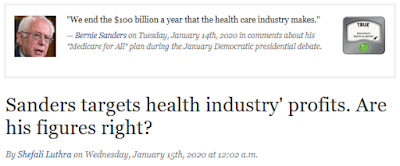Another case in point, this time from PolitiFact's Twitter account:
“Women make 79 cents on the dollar” (for equal work) Attempts to measure the gap between men and women doing equivalent work have shown a narrower difference, though it depends heavily on the specific profession in question. https://t.co/X6oFOtAmZJ— PolitiFact (@PolitiFact) January 26, 2020
PolitiFact mismatched the fact check of Democrat Bobby Scott with the Sanders claim. Though PolitiFact is inconsistent, it usually rates claims like Sanders' "Mostly False."
In rating Scott's claim, PolitiFact Virginia took pains to detect nuance (bold emphasis added):
The statistics are across-the-board comparisons for all jobs lumped together and do not specifically compare men and women performing the same jobs. Many people, citing the statistic, wrongly use it as an apples-to-apples comparison of pay for equal work.In spite of that, PolitiFact's tweet suggests Sanders' statement about women receiving 79 cents on the dollar for the same work is "Mostly True."
Scott’s statement, however, is nuanced. He says women get 80 percent pay for doing "similar" jobs as white men, which is different than saying the "same" job as men.
And after PolitiFact Virginia did all that work to argue "similar" means something different than "the same" (baloney, we say), PolitiFact's tweet tries to send PolitiFact Virginia's message using the word "equivalent."
That sure clears things up (Merriam-Webster).
Definition of equivalent
1 : equal in force, amount, or value also : equal in area or volume but not superposable a square equivalent to a triangle
3 : corresponding or virtually identical especially in effect or function
4 obsolete : equal in might or authority
5 : having the same chemical combining capacity equivalent quantities of two elements
6a : having the same solution set equivalent equations
b : capable of being placed in one-to-one correspondence equivalent sets
c : related by an equivalence relation
Why couldn't PolitiFact just take the straightforward route and present one of its old ratings directly parallel to the claim it attributed to Sanders?
Perhaps we'll never know. But it was probably bias.





